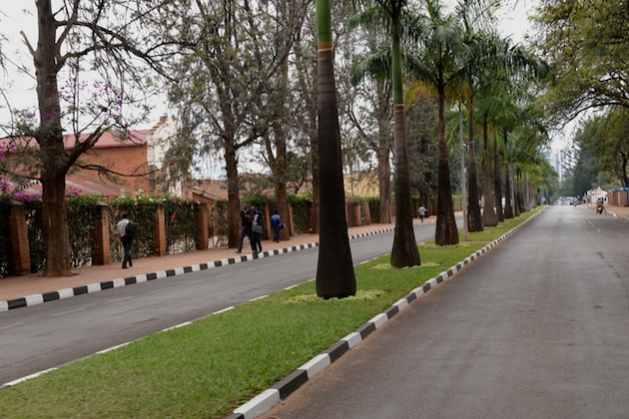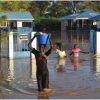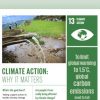Creator and Web page data
- This web page: https://www.globalissues.org/article/797/cop17-durban-climate-conference.
- To print all data (e.g. expanded aspect notes, exhibits various hyperlinks), use the print model:
On this web page:
Introduction
 November 28 – December 9, 2011, Durban, South Africa was the venue for the seventeenth annual United Nations Local weather Change Convention, also referred to as the seventeenth Convention of the Events — or COP 17.
November 28 – December 9, 2011, Durban, South Africa was the venue for the seventeenth annual United Nations Local weather Change Convention, also referred to as the seventeenth Convention of the Events — or COP 17.
Predictably and sadly, the identical points complained about at earlier annual conferences for the previous decade proceed to recycle themselves:
- Lack of high quality (if any) media protection
- West stalling on doing something making an attempt in charge India and China as an alternative
- Lack of funding
- Disagreement on tips on how to deal with it
- and many others.
Because the previous twenty years have proven making an attempt to get international settlement on tackling local weather change appears to be futile. By comparability, extra targeted and restricted curiosity of elites, nonetheless, are simpler to push by means of, akin to wars primarily based on geopolitical threats (actual and imaginary), or financial crises (the place banks and different elites most answerable for the crises are bailed out by bizarre residents).
Moreover, because the West has usually proven prior to now decade or extra (even when their economies had been doing good) paying now for one thing that appears to be an issue sooner or later is difficult to simply accept. It’s simpler, due to this fact, to stall and maintain blaming China, India and different rising nations regardless of the historic inequality of these emissions. However ignoring that makes it simpler to hope these rising nations will choose up the burden of addressing emissions rises.
Typically talking, media protection of local weather change points and these conferences has been a combined bag over the previous decade. More moderen years has seen elevated curiosity and protection (although many necessary points are glossed over in mainstream media sound-byte model reporting).
Nevertheless, by comparability, this yr’s mainstream media protection of this important convention was near pathetic, to place it politely. In actuality cash speaks and so brief time period and elite/institution views are inclined to prevail, which is why governments can so rapidly get the 99%
to bail out the banks and the highest 1% with many trillions of {dollars}, whereas discovering billions for combating much more devastating local weather change has taken virtually 2 a long time up to now with none convincing outcomes.
Personally observing mainstream TV information in UK through the week of the Durban talks revealed virtually no main headlines till the final day and even then just some moments of summarizing a whole two weeks, which in fact just isn’t sufficient. However my very own observations weren’t systemmatic. Nevertheless, media watchdog Media Lens confirmed my fears of poor protection, not simply within the UK however elsewhere such because the US:
Media curiosity within the topic has crashed. Dr. Robert J. Brulle of Drexel College describes a
collapse of any important protection of local weather change within the [US] media. We all know that 2010 was a document low yr, and 2011 will in all probability look a lot the identical. If the media does not draw consideration to the difficulty, public opinion will decline.…
Equally disturbing is the variation in media efficiency throughout the globe. A large-ranging Reuters examine on the prevalence of local weather skepticism on the planet’s media — Poles Aside — The worldwide reporting of local weather skepticism – targeted on newspapers in Brazil, China, France, India, the UK and the USA. The intervals studied had been February to April 2007 and mid-November 2009 to mid-February 2010 (a interval that included the UN local weather change summit in Copenhagen and
Climategate). Remarkably, the examine concluded that local weather skepticism ispredominantly an Anglo-Saxon phenomenon, discovered most ceaselessly in US and British newspapers.…
And so we discover that Britain and the US — the 2 nations responding most aggressively to alleged
threatsto human safety in nations like Afghanistan, Iraq and Libya — are additionally the 2 nations least excited about responding to the very actual menace of local weather change.
Local weather Disaster – The Collapse In Company Media Protection
, Media Lens, December 1, 2011
An extra concern that Media Lens additionally raises is what they described as capitalism trampling on journalism
:
A first-rate instance of this trampling was equipped by the high-profile BBC collection Frozen Planet, narrated by David Attenborough, specializing in life and the setting within the Arctic and Antarctic. British viewers will see a complete of seven episodes, the final of which,
On skinny ice, offers with the specter of local weather change.Nevertheless, viewers in another nations will solely watch six episodes. It’s because the BBC packaged the collection in such a approach that the local weather change episode was an
non-obligatory furtherthat international networks might select to reject. And reject it they did — of 30 networks internationally which have purchased the collection, 10 have opted to not purchase the episode on local weather change. Most notable amongst them is the US, the world’s main contributor each to local weather disaster and disinformation about the issue.
Local weather Disaster – The Collapse In Company Media Protection
, Media Lens, December 1, 2011
In the US, the annual Tyndall Report, which screens the each day nightly newscasts of the three predominant TV retailers (ABC, CBS, and NBC) discovered simply 4 tales on local weather change for all the 2011 on the three prime time information exhibits, two of them being simply over 2 minutes every (the opposite two I can not entry from overseas).
The particular exhibits monitored are in fact not the one information proven within the evenings, and different retailers like CNN aren’t included, and neither is the Web, however 2/3rds of individuals get their information from TV within the US, as Jim Lobe famous in a information story protecting this yr’s Tyndall report. In that story, Andrew Tyndall, was interviewed by Jim Lobe who additionally added:
It’s secure to say that the community information is complicit on this nation’s [the USA] international warming denialism, reinforcing the issue, versus reporting on it.
Arab SpringDominated TV Overseas Information in 2011, Inter Press Service, January 2, 2012
And whereas it appears unimportant to the mainstream media, nature continues its course:
Whereas public concern grows and media protection collapses, the local weather change drawback goes by means of the roof. In response to a latest examine by the US Division of Power, the worldwide output of heat-trapping carbon dioxide jumped by the largest quantity on document in 2010. The world pumped about 564 million extra tons of carbon into the air in 2010 than it did in 2009, a rise of 6 per cent. The most recent figures imply that ranges of greenhouse gases
are increased than the worst case state of affairs outlined by local weather consultants simply 4 years in the past, USA Right this moment studies.…
Within the US alone, roughly $3.5 bn is invested yearly in lobbying actions on the federal stage. Lately, Royal Dutch Shell, the US Chamber of Commerce, Edison Electrical Institute, PG&E, Southern Firm, ExxonMobil, Chevron, BP and ConocoPhillips all made the highest 20 record of lobbyists. The local weather marketing campaign organisation 350.org estimates that 94 per cent of US Chamber of Commerce contributions went to local weather denier candidates.
Local weather Disaster – The Collapse In Company Media Protection
, Media Lens, December 1, 2011
And these are rises of carbon emissions even through the powerful financial circumstances.
Media Lens and USA Right this moment are referring to the international carbon mission report.
That report provides that though China, USA, India, and Russia accounted for the biggest emissions progress in 2010, Per capita emissions of developed nations stay a number of instances bigger than these of growing nations.
In different phrases, important — and fairer — positive factors could be obtained if wealthy nations would sort out their emissions (as has repeatedly been identified for some 2 a long time).
Reuters summarized the above report and likewise added {that a} separate examine printed not too long ago concluded there was virtually no probability of limiting warming to 2 levels Celsius primarily based on enormous investments in polluting energy stations.
The abstract of that report from the journal, Nature Local weather Change, worries: How nations intend to maintain inside a 2 °C threshold, not to mention take into account at [sic] 1.5 °C threshold, is unclear in gentle of present progress
(or lack of).
Regardless of Europe being heading in the right direction to satisfy its Kyoto commitments, international carbon dioxide emissions are nonetheless on the rise having spiked by 45% since 1990 to achieve a document stage of 33 billion tonnes final yr.
… to remain beneath 2 °C all through this century, annual emissions should come down by about 4 billion tonnes of carbon dioxide equal from the current day stage to about 44 Gt of carbon dioxide equal in 2020. Even then, there may be only a 66% chance of staying inside the 2 °C threshold by 2100. Out of the almost 200 situations studied, solely three give a 90% chance of staying beneath 2 °C this century, and all of these depend on commercially unproven applied sciences to seize and retailer carbon-based greenhouse gases. Even with the usage of these applied sciences, there may be at greatest a 50% chance of staying beneath 1.5 °C this century. Worryingly, if we wait till 2030 for emissions to peak, we’re extra more likely to be seeking to keep away from 3 °C this century than 2 °C. In brief, the two °C threshold is steadily slipping of attain, and 1.5 °C already appears unachievable.
Preserving the typical temperature improve inside 2 °C of pre-industrial ranges implies a goal of 450 components per million (ppm) C02 within the ambiance. However 450ppm is already feared as not a secure goal, however the one sensible one to intention for now due to lack of progress amongst industrialized nations prior to now 2 a long time. And what if we get to 451 ppm?
How a lot will the world change if we improve CO2 ranges to 451 ppm? Time will inform, however by some means we could also be duplicating in energy in simply 200 years what nature itself requires 10,000 years to do. We’re making use of that forcing past the purpose at which nature has at all times stopped.
We’re duplicating inside that brief time interval the best single drive on this planet that nature alone has wielded for the previous 2.5 million years. However nature does so slowly, fastidiously and predictably.
We’re doing so quickly, erratically, and with out consciousness or understanding of the implications, and even taking lengthy sufficient to acknowledge that what we’re doing does certainly have an irreversible impact.
Frequent however Differentiated Duty Precept Sidelined Once more
As Inter Press Service (IPS) summarized:
What’s abundantly clear is the large divide between the wealthy and poor nations. Poor nations need deep cuts in emissions by the industrialized world, and the latter proceed to withstand important cuts and legally binding targets.
This website’s part on local weather justice has lengthy gone into some element about
- How the
Frequent however Differentiated Duty
acknowledges that wealthy nations have emitted a lot of the greenhouse gases which might be inflicting local weather change, that growing nations’ emissions are more likely to rise on their path to industrialization and making an attempt to satisfy primary social and growth wants; and that due to this fact whereas the objectives are the identical, the means to sort out local weather change might be completely different. - 12 months after yr at local weather summits, it appears this precept is usually ignored by some wealthy nations and their media.
- It has due to this fact been simpler in public in charge nations like China and India for reacting negatively and being uncooperative when confronted with stress to undergo emission discount targets (earlier than many wealthy nations exhibit they will do the identical).
Greenhouse gases have a tendency to stay within the ambiance for a lot of a long time so historic emissions are an necessary consideration.
The next exhibits that the wealthy nations (often called Annex I nations
in UN local weather change converse) have traditionally emitted greater than the remainder of the world mixed, despite the fact that China, India and others have been rising not too long ago. That is why the widespread however differentiated tasks
precept was acknowledged.
(Chart up to date in January 2012 so as to add knowledge as much as 2008 and preliminary estimates for 2009 and 2010)

Little doubt, growing nations ought to pay attention to their latest rise and likewise do extra to curb their emissions. However given their later entry to industrialization and that their per capita emissions are even lower than wealthy nations, extra emission discount may be achieved per particular person in wealthy nations.

The US and others have characterised the marketing campaign for local weather justice and equality to the ambiance as a approach to declare local weather reparations
; that it’s unfair to make the industrialized nations pay for local weather emissions into the previous century or extra at a time once they didn’t know it could trigger extra hurt.
That appears affordable. Nevertheless, one of many implications is that any settlement that’s subsequently drawn up will, in impact, put disproportionately extra burden on the poorer nations to sort out an issue they didn’t largely trigger. The poor are much less more likely to have the assets to take action, which additionally implies that tackling local weather change is much less doubtless to achieve success.
That is why wealthy nations are being requested to significantly take into consideration the sort and approach they use power along with serving to the poorer nations (not essentially reparations
however by means of significant expertise and adaptation help — which might be far more cost effective than the bailouts readily handed to folks that did trigger a serious drawback).
As well as, there may be little equity in asking China, India and others to be topic to emission targets when many wealthy nations didn’t obtain the watered down Kyoto targets themselves.
Some rising nations are in a gray space — India, China, Brazil, and many others are quickly growing and though they’ve huge social and growth issues excellent, a few of their rich are as rich (some extra so) as these in industrialized nations. As such, wealthier growing nations aren’t essentially the goal (nor asking) for such adaptation funds.
It’s definitely extra complicated than a couple of sentences on this web page can present, however the simplification provided by wealthy nation leaders and their media hides this complexity yr after yr. (See local weather justice from this site for extra particulars on this.)
Durban assembly consequence
The assembly in Durban appeared fairly intense; some such because the US and EU had been eager on getting China, India and different giant rising nations to signal on to binding emission discount agreements. These nations had been understandably reluctant and even when they might be gaining a stronger voice within the wake of the worldwide/Western monetary disaster, this assembly additionally confirmed that they haven’t eclipsed the West (at the very least not but) on the diplomatic entrance.
Stephen Leahy, writing for IPS, supplies a helpful abstract of the Durban assembly:
The world is more and more dedicated to harmful ranges of world warming with one more failure by nations of the world to conform to wanted reductions in carbon emissions right here in Durban.
…
After two weeks and an extra 29 hours of intense and even bitter negotiations, the 193 nations taking part within the United Nations local weather talks agreed to a posh and technical set of paperwork known as the
Durban Platform.These embody the continuation of the Kyoto Protocol, a proper construction for a Inexperienced Local weather Fund, new market mechanisms, and extra.…
At the moment the promised emission reductions by industrialised nations and people of China, Brazil, South Africa, India and others beneath the 2009 Copenhagen Accord assure a world that’s at the very least 3.5 levels Celsius hotter on common in line with local weather science. It is going to be double that over giant components of the world. Some evaluation says this international common may very well be even increased rising to 4 or 5 levels Celsius threatening our species with annihilation.
Apparently, the extent of discount promised by the industrialized world is small in comparison with its portion of emissions. And it seems as if growing nations have misplaced out in some ways:
Regardless of the political posturing by the US, Canada and even the European Union, the very fact is that growing nations’ promised reductions are better than the industrialised world which might be answerable for 75 p.c of the full human emissions within the ambiance.
…
Ready till 2020 to make main cuts means these cuts should be far deeper and way more expensive to have any hope of preserving temperatures beneath two levels Celsius,
…
The
Durban Platformfeatures a second dedication interval of the Kyoto Protocol that can start January 2013, avoiding a niche on the finish of the primary dedication interval ending subsequent yr. The size of the second dedication interval is to be determined at COP 18 in Qatar.Growing nations insisted on this situation as a result of Kyoto is the one legally binding emissions discount settlement. Nevertheless, it solely requested for small reductions from industrialised nations like these in Europe, Canada, Australia, Japan and some others. The U.S. opted out and Canada ignored its obligations and elevated emissions 24 p.c. And now Canada, Japan and Russia have mentioned they are going to take not participate within the second dedication interval.
However it isn’t simply growing nations which have misplaced out; nearly all of the primary world can have misplaced out too. As a result of, as Stephen Leahy rightly notes, trillions are simply and rapidly made accessible to bail out the elite in a monetary crises. However with regards to an excellent greater disaster that’s additional away (and admittedly more durable, maybe, to internalize), funds all of the sudden appear onerous to seek out; governments are all of the sudden cash-strapped.
Non-public sources explicitly embody carbon markets as governments from the wealthy nations ceaselessly cited the monetary disaster has tied their purse strings. Civil society and a few growing nations famous that governments have made trillions of {dollars} accessible for the financial institution and monetary sector and that world’s navy finances is greater than 10 instances what is required for the GFC [Green Climate Fund].
See additionally George Monbiot’s word on this, evaluating the $7 trillion in US bailout for their very own banks, whereas an estimate for capping local weather change globally would require lower than a tenth of that: $650 billion. And distinction how rapidly the trillions had been made accessible versus how difficult it’s for a local weather fund to return about.
The opposite necessary situation for growing nations is that any local weather fund be unbiased of Western management, one way or the other, due to the unhealthy expertise most poor nations have had prior to now.
There was numerous outcry on the stance of the US. Democracy Now! for instance reported on the Startling Stage of Obstructionism and Defeatism
by the Obama Administration on a U.N. Local weather Deal, choosing non-legally binding agreements.
Others, such because the EU, needed a brand new legally binding settlement, however because the Third World Community, primarily based in Malaysia, requested, What’s the level of a brand new treaty? In Bali, 2007, the mechanisms had been already agreed:
The fact is that the Local weather Conference and the Kyoto Protocol that make up the present legally binding local weather structure desperately want implementing, not changing. Developed nations seem
progressiveby asking for a legally binding treaty or the mandate for one, when the actual reality is that they’re violating the present legally binding regime, shifting he goalpost agreed within the Bali Roadmap, and reneging on agreements for a second dedication interval of the Kyoto Protocol.
Constructing on the Bali Mandate
, Third World Community, December 2011
This double-standard (in lots of areas, not simply setting) is a serious purpose many protests have erupted all through the industrialized world. The elite appear up to now faraway from the consequences of local weather change that maybe there isn’t a incentive for them to do issues about it, successfully, in contrast to through the latest monetary disaster. As a substitute, resigning to a excessive stage of warming is probably acceptable to the elite as they are going to be higher geared up to take care of it.
Extra data
For extra in regards to the points from different organizations, listed here are some beginning factors:
Information tales from IPS
Beneath is an inventory of tales from Inter Press Service associated to the Durban local weather convention and its aftermath.
-
Fishers in Madagascar adapt to lethal seas on account of local weather change
– UN Information

Fishing communities within the south of Madagascar are dealing with generally lethal sea circumstances on account of local weather change, however with the assistance of the UN’s Worldwide Labour Group (ILO) are discovering methods to adapt to the brand new circumstances they face.
-
Ladies Affected by Gender-Biased Local weather Change Deserve Justice
– Inter Press Service

BULAWAYO, Apr 11 (IPS) – Whereas analysis into the unequal impacts of local weather change on girls is rising, extra is required to allow them to appreciate their rights to local weather justice.
-
To Mitigate Local weather Change Related Disasters That Influence the Agricultural Sector – Launch Multipronged Efforts
– Inter Press Service
-
Taking Cost: Three Actions to Assist Fight Local weather Change and Save Amazonia
– Inter Press Service

NEW YORK, Apr 04 (IPS) – Local weather change is the defining disaster of our time––it’s the final equalizer from which nobody is immune. The Earth’s ecosystems are on the brink of collapsethreatening biodiversity and human societies in unprecedented methods at a world scale.
-
The Influence of Local weather Change on a Biodiversity Scorching Spot
– Inter Press Service

KATHMANDU, Nepal, Mar 29 (IPS) – If there’s a place the place the interlinkages and dependencies between the consequences of local weather warming and biodiversity loss are clearly at show, it’s Nepal. There may be clear proof on the impression of local weather change on the nation’s ecosystem contemplating the truth that Nepal is a crucial biodiversity hotspot.
-
World Information in Transient: Local weather change within the countryside, Yemen polio drive success, growth and peace
– UN Information

Local weather change is disproportionately affecting the incomes of rural girls, the poor and older populations, who even have the least capability to adapt to excessive climate occasions, a brand new report from the UN Meals and Agriculture Group (FAO) revealed on Tuesday.
-
UN chief appeals for better assist for small islands combating local weather change
– UN Information

Extra funding is required to assist Small Island Growing States (SIDS) on the frontlines of local weather change, UN Secretary-Basic António Guterres mentioned on Saturday in Saint Vincent and the Grenadines.
-
Local weather Change Is Amplifying Family’s Meals Insecurity, Placing Extra Strain on Ladies’s Psychological Well being
– Inter Press Service

KATHMANDU, Feb 12 (IPS) – Research have lengthy proven that some girls’s decrease standing in Nepali households might imply that they eat final and fewer and in consequence lack diet. Specialists are actually wanting into how this might have an effect on their psychological well being, and if the rising impacts of local weather change may amplify the method.
-
Beneath the Scorching Solar Kenyan Farmers Discover New Methods to Beat Local weather Change
– Inter Press Service

KOTIANG, KENYA, Jan 26 (IPS) – Rural Kenyans are forging a path towards a extra sustainable future and defending their lives and livelihoods from local weather change by means of regenerative agriculture, nurturing hope for his or her communities and the setting.
-
IPS Provides Local weather Change Justice Fellowship
– Inter Press Service

UNITED NATIONS, Jan 24 (IPS) – IPS is providing an distinctive alternative for 2 journalists to develop their understanding of local weather change justice.
-
Tackling well being impacts of local weather change and scaling up digital local weather motion within the highlight at COP28
– UN Information

Delegates at COP28 in Dubai on Saturday known as for stronger and extra resilient international well being programs, that are indispensable to defending populations from the unfavorable impacts of local weather change on well being.
-
Restoring Indigenous Timber: New Mission to Fight Local weather Change in Rwanda
– Inter Press Service

KIGALI, Dec 01 (IPS) – With the continued nationwide tree-planting marketing campaign, Rwanda seeks to interchange its degraded forest ensuing from charcoal manufacturing and firewood and improve the necessity for development supplies with new indigenous bushes to fight local weather change.
-
Local weather change dangers upending international battle in opposition to malaria
– UN Information

Local weather change and its impacts, significantly excessive climate and heatwaves, pose a “substantial danger” to progress being made to battle malaria, the UN World Well being Group (WHO) mentioned on Thursday.
-
Africa Will Not Address Local weather Change With no Simply, Inclusive Power Transition
– Inter Press Service

NAIROBI, Nov 24 (IPS) – A simply transition must be seen as a chance to rectify a few of the wrongs the place girls aren’t prioritised within the power combine, but their expertise of the impression of local weather change is very large, says Thandile Chinyavanhu, a younger South African-based local weather and power campaigner with Greenpeace Africa.
-
GLOBAL COOPERATION ON CLIMATE CHANGE: What Have We Achieved and What Must Occur Subsequent?
– Inter Press Service

NEW YORK, Nov 22 (IPS) – Local weather change has been a supply of concern among the many worldwide group because the Nineteen Seventies. But, virtually fifty years because the situation was first raised in worldwide diplomatic circles by distinguished scientists, the state of affairs continues to deteriorate, with rises in temperatures and excessive climate inflicting ever-magnifying issues around the globe.
-
Time to Convert Local weather Change Rhetoric into Motion, Says WFP’s Gernot Laganda
– Inter Press Service

HYDERABAD, INDIA, Nov 14 (IPS) – ‘When you ask what local weather justice is, then the litmus take a look at for local weather justice is on the native stage. So, local weather justice must be judged by how many individuals are shielded from climate-vulnerable circumstances that they haven’t any hand in creating.’ – Gernot Laganda, Director of Local weather Change Adaptation and Catastrophe Threat Discount on the United Nations World Meals Programme (WFP)
It’s essential to slender the gaps and make sure that local weather finance goes to the place persons are most susceptible, says Gernot Laganda, Director of Local weather Change Adaptation and Catastrophe Threat Discount on the United Nations World Meals Programme (WFP)—particularly as essentially the most fragile states solely obtain USD 2.1 per capita whereas non-fragile states obtain USD 161.
-
Explainer: How AI helps fight local weather change
– UN Information

Synthetic intelligence (AI) is already making inroads worldwide in well being, schooling and trade, however how can this cutting-edge expertise assist the world fight and mitigate the consequences of local weather change?
-
‘Cease the insanity’ of local weather change, UN chief declares
– UN Information

UN Secretary-Basic António Guterres on Monday known as on the world to “cease the insanity” of local weather change as he visited the Everest area in Nepal the place melting glaciers are placing complete communities liable to extinction.
-
Local weather Change Turns African Rivers into Epicentres of Battle
– Inter Press Service

NAIROBI, Oct 24 (IPS) – Virtually all main river basins in Africa have turn into the epicentres for conflicts over the past 20 years, and agricultural yields on the continent might drop by as much as 50 p.c within the coming years owing to the drying up of ‘conventional’ water sources, thanks partially to results local weather change and degradation of the setting, the inaugural version of the State of Africa’s Surroundings Report 2023 launched in Nairobi finds.
-
World Information in Transient: Sandstorm alert, albinism and local weather change, rights in Peru
– UN Information

Sand and mud storms are more and more threatening individuals’s well being, security and livelihoods – and local weather change is making issues worse.
-
Wrecked by Local weather Change, Farmers in Kashmir Shift to Lavender Cultivation
– Inter Press Service

BIJBEHARA, INDIA, Sep 29 (IPS) – Creating resilience is essential to local weather change justice. In Bijbehara, a hamlet south of Kashmir’s capital, Srinagar, lavender farming has meant farmers grappling with unseasonal rains, extended warmth waves, and extreme water shortage have discovered a brand new technique of survival.
-
Peru Faces Problem of Local weather Change-Pushed Inner Migration
– Inter Press Service

LIMA, Sep 28 (IPS) – Practically 700,000 individuals have migrated internally in Peru because of the results of local weather change. This mass displacement is a transparent drawback on this South American nation, one of the vital susceptible to the worldwide local weather disaster on account of its biodiversity, geography and 28 several types of climates.
-
Bangladesh’s Battle In opposition to Local weather Change: A Nation at Threat
– Inter Press Service

DHAKA, Sep 01 (IPS) – Bangladesh faces one in all its most important challenges ever — local weather change. Rising sea ranges, excessive climate occasions, and altering rainfall patterns are already profoundly impacting this nation.Bangladesh, a picturesque land of rivers, lush inexperienced landscapes, and a vibrant cultural heritage, faces one in all its most important challenges ever — local weather change.
-
Africa Local weather Summit: a Essential Alternative for Collective Motion on Local weather Change
– Inter Press Service

NAIROBI, Sep 01 (IPS) – As an African, I’ve seen first-hand the devastating results of local weather change. I’ve met communities displaced by floods in Malawi, Mozambique and Zimbabwe. I’ve spoken to farmers from Northern Kenya who’ve misplaced their crops to drought. These experiences have made me aware of how pressing it’s to deal with the local weather disaster.
-
African kids bearing the brunt of local weather change impacts
– UN Information

Youngsters in Africa are among the many most in danger from local weather change impacts however are being woefully disadvantaged of the financing vital to assist them adapt, survive and reply to the disaster, the UN Youngsters’s Fund (UNICEF) mentioned in a brand new report on Friday.
-
Local weather Change Is Making Us Sick, Says WHO Envoy
– Inter Press Service

BULAWAYO, Aug 02 (IPS) – Local weather change is making us sick. It has turn into pressing to construct resilient well being programs to safe humanity’s well-being, says the particular envoy for local weather change and well being of the World Well being Group (WHO).
-
Spike in dengue circumstances on account of international warming, warns WHO
– UN Information

International warming marked by increased common temperatures, precipitation and longer intervals of drought, might immediate a document variety of dengue infections worldwide, the World Well being Group (WHO) warned on Friday.
-
New Analysis Seeks Breakthrough in Understanding International Warming and the Ocean
– Inter Press Service

SYDNEY, Jul 19 (IPS) – The Canada-based Ocean Frontier Institute may be very clear in regards to the significance of a brand new collaborative ground-breaking ocean analysis program. International warming can’t be successfully tackled, and human life can not survive on Earth with out the ocean.
-
Local weather Change and Improvement
– Inter Press Service

BEIJING, Jul 04 (IPS) – There may be little doubt that human exercise is accelerating local weather change. Our actions are inflicting international warming and probably disastrous local weather change.
-
Authorized safety important for individuals displaced by local weather change: UN skilled
– UN Information

An unbiased UN-appointed local weather skilled on Tuesday known as for full authorized safety to be given to these displaced by the impacts of local weather change, to ensure their human rights.
Creator and Web page Data
- Created:






















+ There are no comments
Add yours